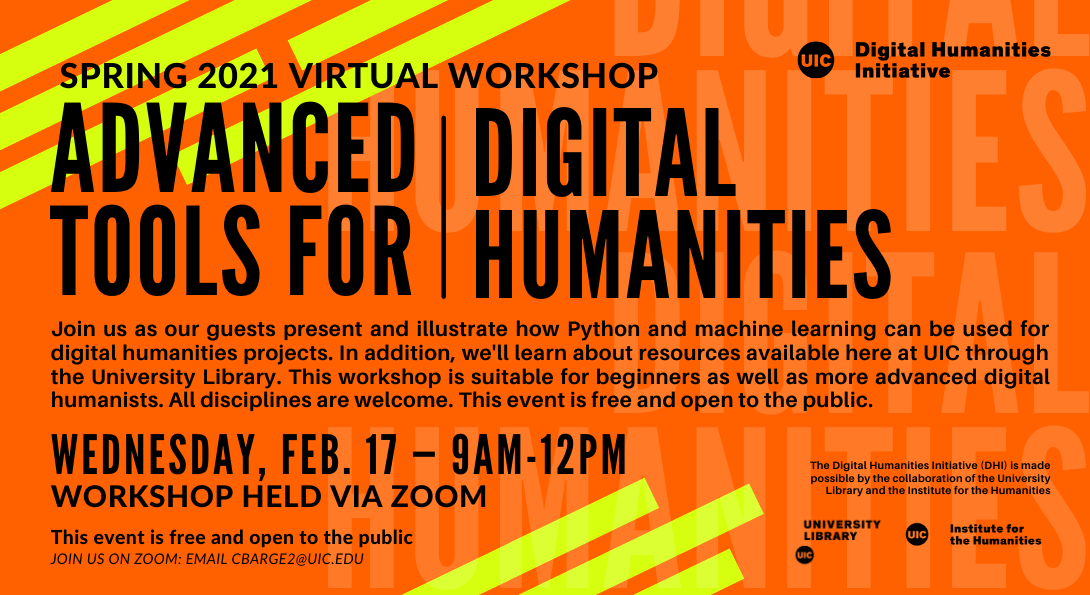Advanced Tools for Digital Humanities
Digital Humanities Workshop
February 17, 2021
9:00 AM - 12:00 PM

--9:00-9:50am--
"An Introduction to Machine Learning and its Applications in the Digital Humanities"
Machine Learning is a branch of Artificial Intelligence. Through machine learning, researchers do not hardcode programs to perform tasks, rather they allow a computer to generate its own rules to perform these tasks. This is achieved via various methods of training. While machine learning has its conceptual incipience in the 1960s, it did not receive much public attention until the early 2010s. Over the past five years, the methods and applications of machine learning has grown substantially, while the resources for implementing machine learning, such as TensorFlow, Keras, PyTorch and FastAI, have made it much more accessible. Despite this accessibility a large gap remains. This gap exists in two forms: conceptual understanding of machine learning and knowledge of programming. This presentation focuses on the former by providing digital humanists a basic introduction to machine learning while presuming no knowledge of mathematics or programming. The presentation will address popular misconceptions about artificial intelligence, explain the fundamental concepts and terminology of machine learning, and conclude with an explanation of the resources available to humanists for getting started. The goal of this presentation is, therefore, to provide viewers with a starting point for exploring machine learning and its potential application to their projects.
William Mattingly is a Postdoctoral Fellow for the Analysis of Historical Texts at the Smithsonian Institution Data Science Lab in collaboration with the United States Holocaust Memorial Museum (USHMM). His research has focused on developing text classification neural network models to identify sources in medieval texts. He is also developing named entity recognition (NER) models for ancient and medieval languages, such as Latin (Classical and Medieval), Ancient Greek, Old English, Old Norse, and Old High German. At the Smithsonian and USHMM, he is developing machine learning methods to aid, in among other things, a pipeline for automatically processing and cataloging hundreds of millions of Holocaust documents. He is co-investigator and lead developer for The Bitter Aloe Project project (https://www.rch.uky.edu/project_bitteraloe.html) and lead investigator and developer for the Digital Alcuin Project. He has a B.A. and M.A. in History from Florida Gulf Coast University and a Ph.D. in History from the University of Kentucky. His dissertation research explored using historical social network analysis, cluster analysis, and computational methods for identifying ninth-century intellectual and pedagogical networks.
--10:00-10:50am--
"Introduction to Python and its Research Applications in the Humanities"
What is Python, and why should humanists want to use it? Which digital humanities methods can Python be used for? And what are the first steps for a new Python-user to get started? This presentation, geared towards beginners, will address what Python is and how it can be used for specific research applications in the digital humanities (statistics, text mining, network analysis). The presentation will guide prospective users in the installation, first steps, and basic applications of these research tools, expecting no prior experience in programming or statistics. Specifically, after motivating the use of Python through its many applications, we will examine the installation process through the Anaconda distribution. We will then elucidate the differences between Python’s editor and markdown environments (Jupyter Notebook and Spyder), and then delineate the conceptual logic underlying Python through an introduction to object types (and the methods attached to them) and Python libraries (numpy, Pandas). We will combine what we’ve learned in a research application example to conclude the presentation. My hope is that participants walk away with the feeling that they know where to start if they want to pursue Python further, and that they will want to do so!
Daniella Gáti (any pronouns) is a digital humanist, and scholar of contemporary literature, media, and digital culture. Their current work examines the relationship between social media forms of anti-racist and queer protest and contemporary dissent fiction. He is also developing a coauthored project with an economist that investigates how sentiment analysis of novels can be used to extract valuable information about society’s beliefs about its long-term economic prospects. Daniella received her Ph.D. in English from Brandeis University, an MA in English from the University of Bern, Switzerland, and an MA and BA in Economics, also from Bern. Her dissertation examines the vignette as a counterhegemonic representational form in and around the book in contemporary print and digital fiction, as well as in a book historical dimension.
--11:00-11:50am--
“Advanced Features of Scalar”
Scalar an open source publishing platform available to the UIC community through Digital UIC (digital.uic.edu). It is designed to make it easy for authors to write and publish long-form digital scholarship. Scalar also allows users to assemble media from multiple sources such as YouTube and the Digital Public Library of America and juxtapose them with their own writing in a variety of ways, with minimal technical expertise required. This presentation will cover the basics of creating a Scalar site and then move on to demonstrating the more advanced features available in Scalar. These more advanced features include annotation tools, collaboration and editorial tools, and built-in visualizations.
Janet Swatscheno is the Digital Publishing Librarian at the University of Illinois at Chicago Library. Before joining UIC, she was the Digital Publishing Specialist at the University of Illinois at Urbana-Champaign and a Library of Congress Junior Fellow at the John W. Kluge Center.
_____________________________
Register here:
https://uic.zoom.us/webinar/register/WN_lYZgEIiFR1SevB0cesIAyA
Or an H.323/SIP room system:
H.323:
162.255.37.11 (US West)
162.255.36.11 (US East)
221.122.88.195 (China)
115.114.131.7 (India Mumbai)
115.114.115.7 (India Hyderabad)
213.19.144.110 (Amsterdam Netherlands)
213.244.140.110 (Germany)
103.122.166.55 (Australia)
209.9.211.110 (Hong Kong SAR)
64.211.144.160 (Brazil)
69.174.57.160 (Canada)
207.226.132.110 (Japan)
Meeting ID: 869 8790 9926
Passcode: 74333376
SIP: 86987909926@zoomcrc.com
Passcode: 74333376
After registering, you will receive a confirmation email containing information about joining the webinar.
Date posted
Jan 27, 2021
Date updated
Mar 31, 2021